They Bombed a Children's Hospital
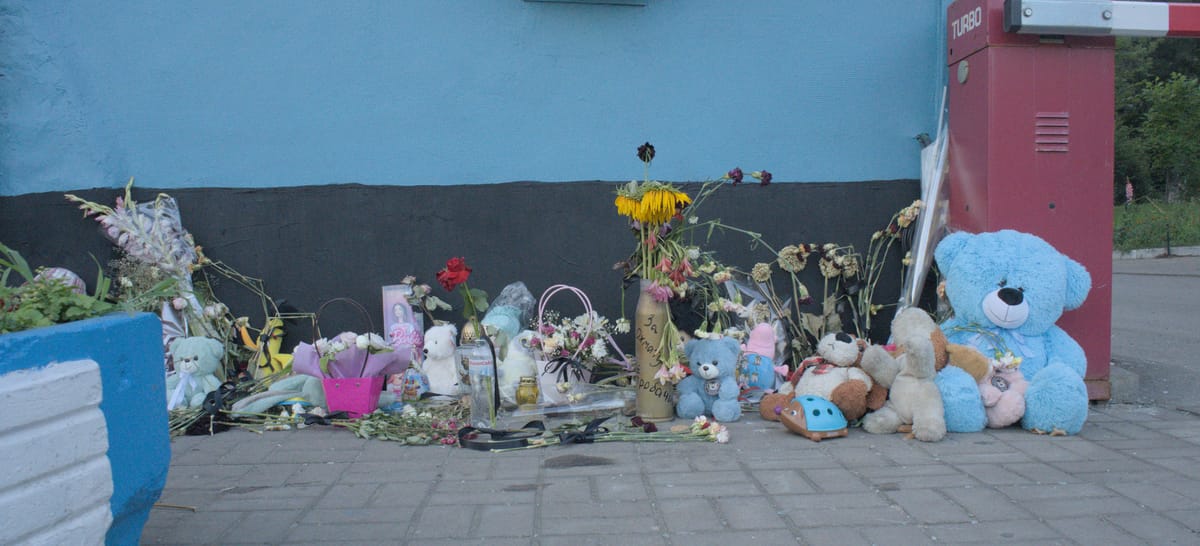
On a normal day, Kyiv's air raid sirens wail about two times. Attacks almost always happen at night. Alarms during the day mostly come to nothing; Every time a jet capable of carrying hypersonic missiles takes off from a Russian airfield, an air alarm is declared in all of Ukraine. It's very rare for those jets to ever do anything that impacts life in Kyiv. Business continues as usual, with some exceptions. Most notably, school and university lessons are moved to shelters, or they’re outright canceled. Most students prefer the second option: sources tell me that this location of a popular food chain is often overcrowded during alarms.
Monday the 8th of July was not a normal day. At 9:30 the air alarm went off and life went on. I was sitting in my go-to hipster cafe, trying to finish a text about life amidst blackouts. Then came the first explosion. I only heard it faintly, because I was wearing headphones. My friend Danylo texted me:
In the café, life went on as usual, only a little quieter. A young woman packed her stuff, presumably to seek shelter in the nearby metro. Just as she got up, more explosions outside. Inside: some gasps, intense texting and a lot of silence. Bad idea to go out into the open now.
Then I got another text from Danylo:
Ohmatdyt is Ukraine's biggest children's hospital. Hundreds of kids from all over the country are treated there every day. Quite a few of my friends have been there in their childhood. At the time, 600 children were in the hospital.
Videos of the incident clearly show a Russian cruise missile of the type Kh-101 diving warhead-first into the toxicology ward of the hospital.
Once the alarm was over, I went to the hospital. Not exactly sure what I was going to do there, I just felt that as someone who calls himself a journalist, it was my job to go there.
I did not take the fastest route. I walked most of the way, not eager to arrive soon. As I got closer, I could hear the sirens of ambulances rushing by.
When I arrived, I saw dozens of people standing across the congested street. Some of them talking on the phone, one woman in tears, screaming. But most were just standing there. Looking silently at the smoke coming from the yard and the ravaged main building. They were not in shock: there just was nothing to say.
I saw a mother holding up a small pillow to shield her son's head from the relentless sun. The boy was lying in a hospital bed on the sidewalk. Or it might have been a stretcher. The memory is a little blurry.
A seemingly endless stream of first responders arrived at the scene. In the hospital yard, amid smoke and dust, soldiers and neighbors forged human chains to carry away debris in a desperate search for survivors under the rubble of what until hours ago had been the toxicology center.
A handful of paramedics stood at the edge of the crowd, leaning on their ready stretchers. Smoking cigarettes, waiting for their work to begin.
I mostly wandered around the scene, looking for spots to get a good view, not keen to find out whether my Swiss press card would get me into the security perimeter.
I didn't take any pictures despite having a camera on me. Didn't feel right. Of course, this was a rookie mistake. However, there is plenty of material out there. If you want to see it, you can google "Ohmatdyt strike".
After what must have been an hour, I decide to head to the nearest metro station. As I walk away from the hospital, I cross paths with dozens of people carrying water for the rescuers: bottles upon bottles, as if they could unbomb the hospital by flooding it with water.
Suddenly, the air alarm goes off again, followed by a bang. I scramble for shelter in an underpass.
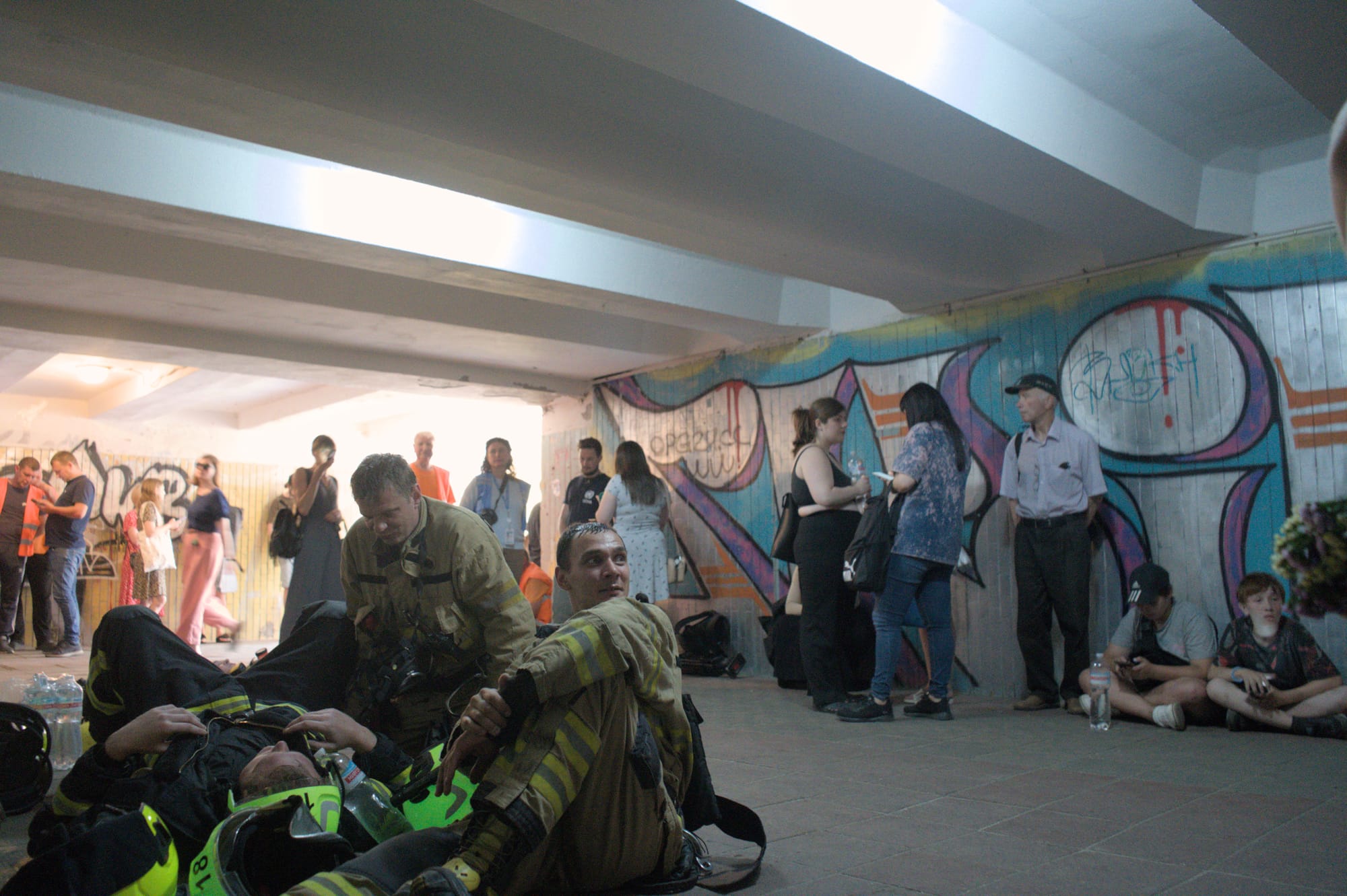
Waiting. Phones beep, the alarm is over. I leave the underpass, find myself at another impact site: A missile has hit nearby, and the whole street is fucked. Windows blown out, some metallic shit hanging off houses, wrecked balconies, missing roofs. A small cleaning crew and some locals are sweeping up glass and debris. A surreal scene, more apocalypse movie than real life. Only a couple taking down a hammock on their balcony serves a reminder that this was just some residential building before it was turned into the fucking Boulevard of Broken Dreams.
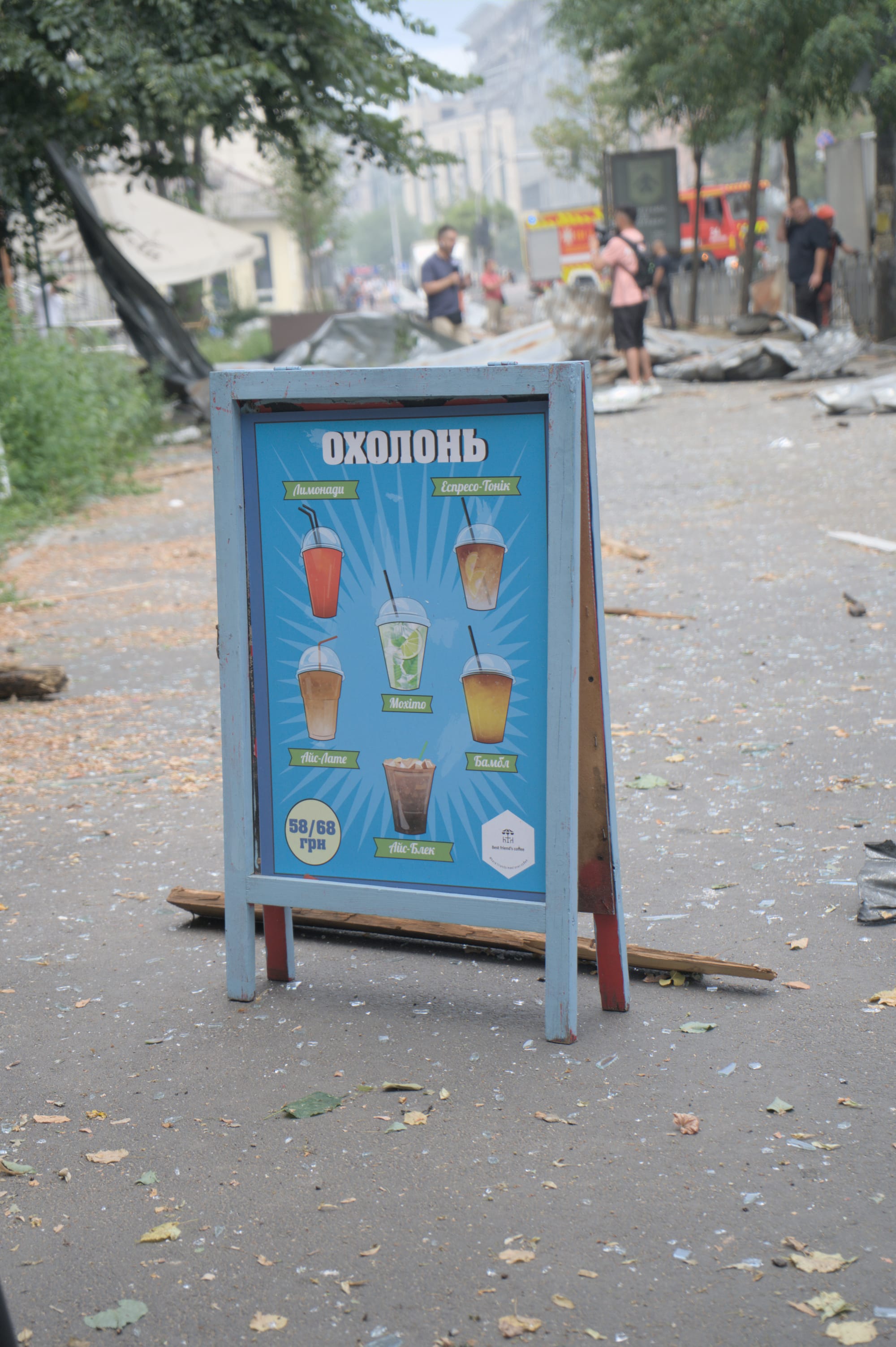
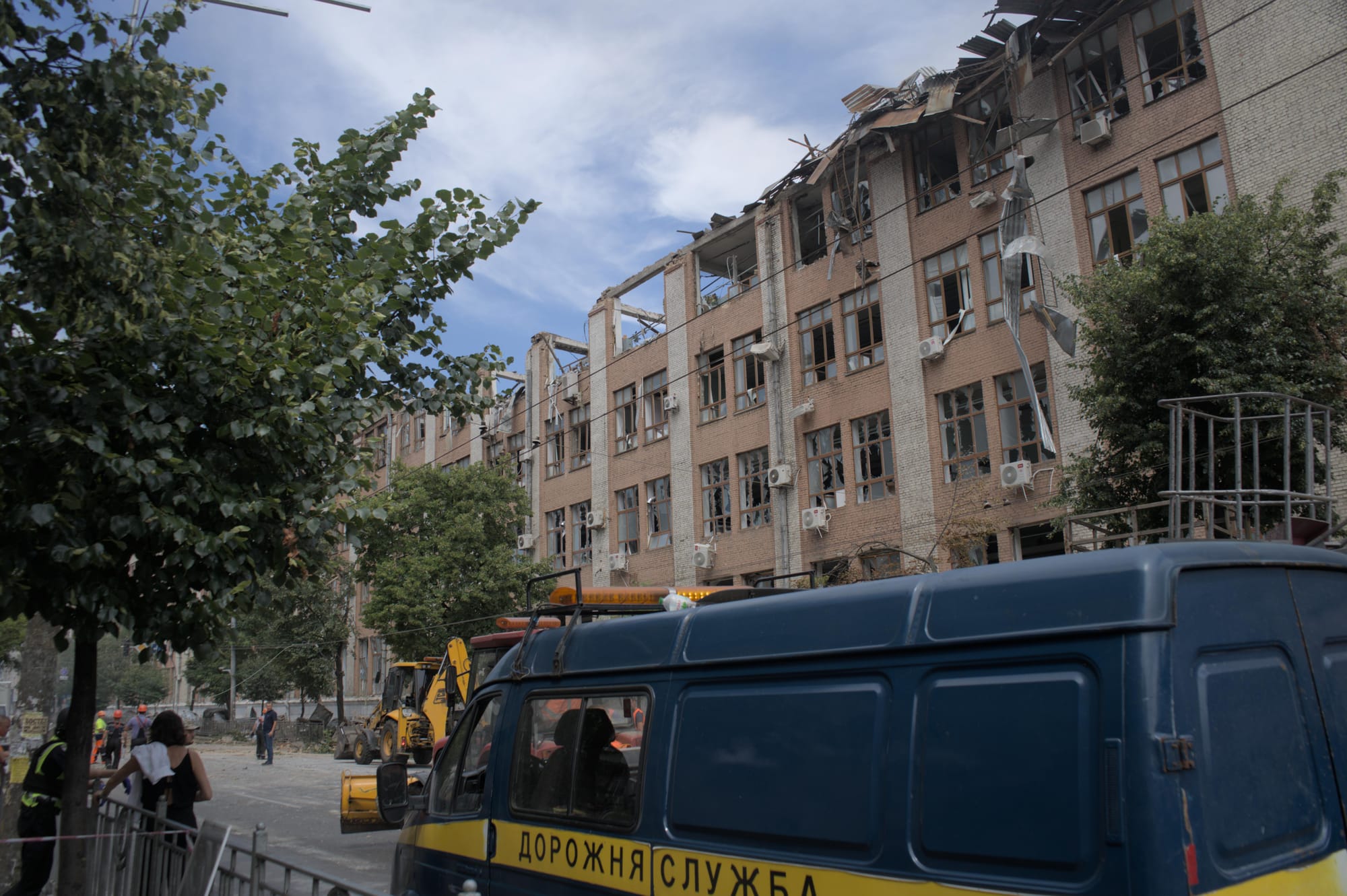
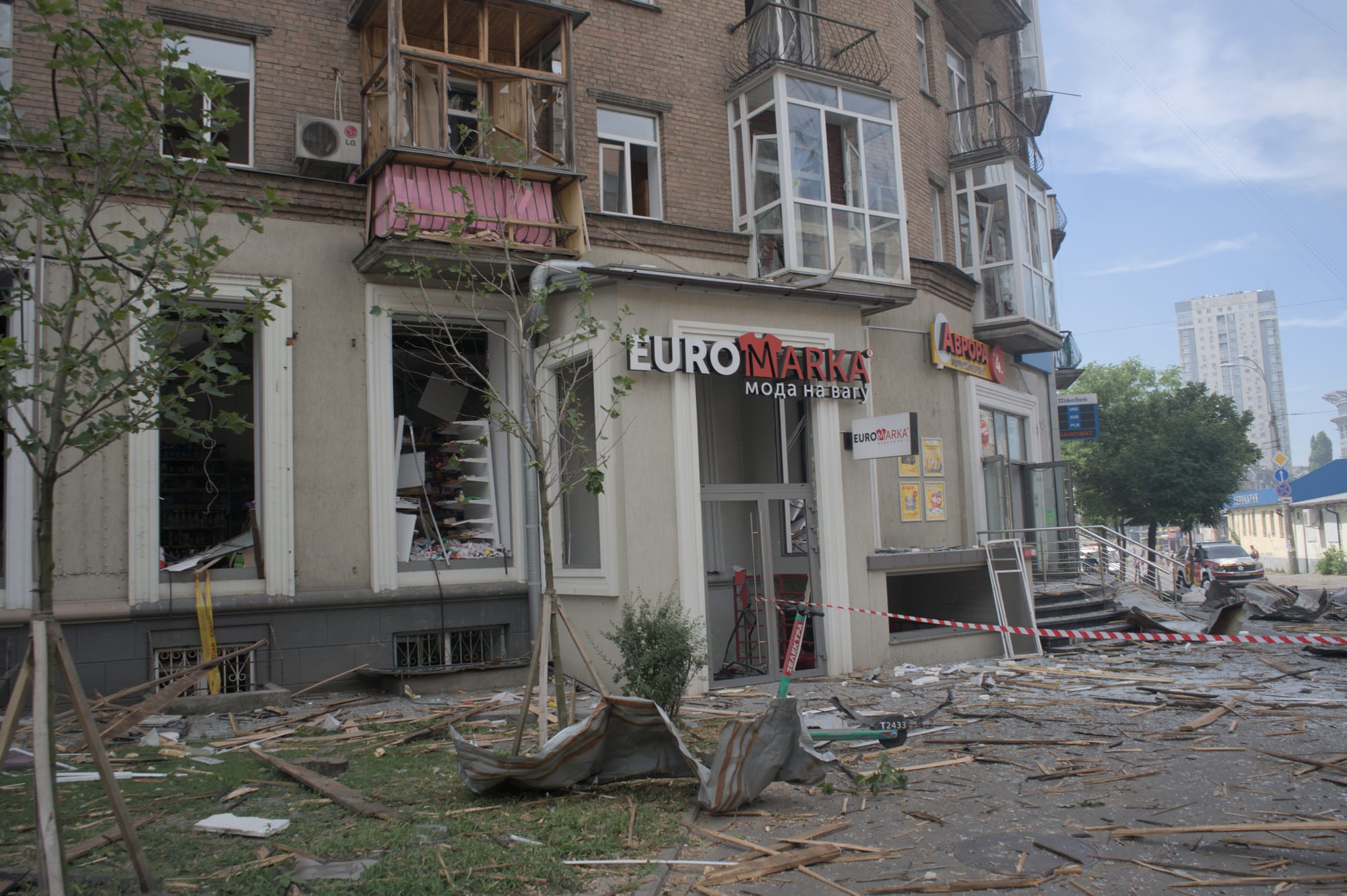
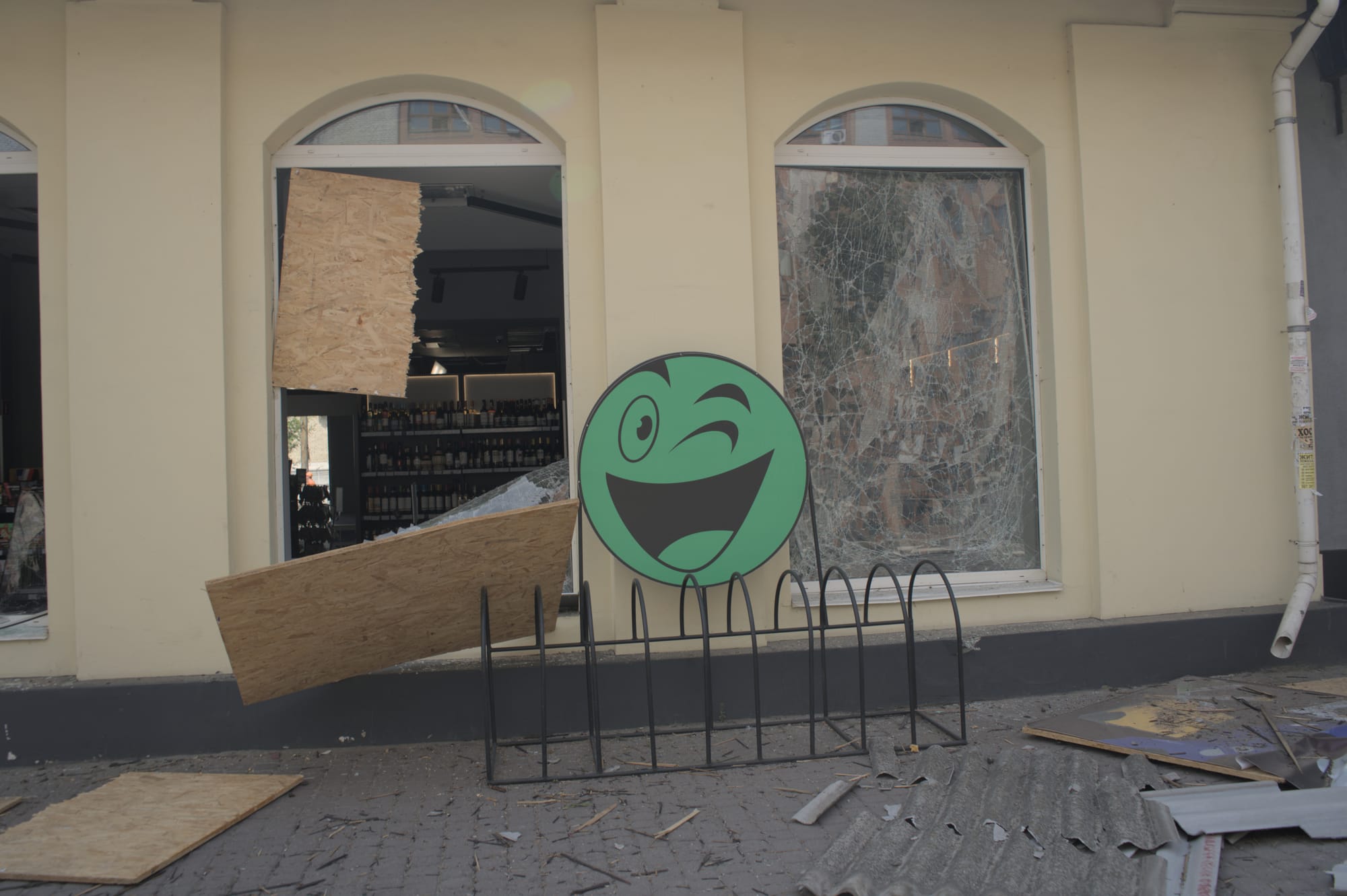
You can click on the images to enlarge
I take some pictures, then another air alarm. Back to the shelter. More waiting. I talk to a woman from nearby. The shockwave has blown out her neighbor’s windows, but she's mainly interested in my camera, wants to get one for herself. When I explain that the lens is separate from the body, she's fascinated.
Finally, we get the all-clear. I take some more pictures, order a cab to get home (I'm staying at the apartment of friends). "Nice try" says the Bolt app. So I get on my feet again and drag myself to the metro: on one side of the station, you have to walk over splinters and debris. On the other side, you can buy shawarma and flowers.
The next week was an empty, amorphous blob of memory. Danylo put it best: "I don’t know how to properly do something today, how to exist…"
For many hours I stared at my empty laptop screen, at an empty document. The cursor just kept blinking, taunting me to put what had happened into words. Elegant words that flow into each other, anecdotes that paint a picture, just alive enough for imagination to fill in the rest. Wrapped into a structure that makes some kind of point, conveys some kind of feeling.
But what did I even feel? Sometimes I managed to get angry. Angry at the people who did this. Who gave the orders, who built the missile, who typed the coordinates into the targeting system.
Bombing a children's hospital is such an absurdly evil thing to do. Not even movie villains do that, so it’s hard to wrap your head around the fact that real humans do. And you can't really be mad at something that's not human.
No, I wasn’t angry. I was fucking sad. And try as I might, I do not have any words to describe that sadness, neither then nor now. “They bombed a children's hospital.” That will have to suffice.
Truth be told, I’m still new to this: what happened really wasn't that special. Kharkiv gets bombed every other week. It's not the first hospital to be hit, and it won't be the last. The Ukrainians were back on their feet a lot faster than me:
My friend Saf self-medicated with some light drugs.
Li went to help at an impact site near her home, but it was already crowded with people trying to help. She took the day off, but went to work the next day. It felt absurd and meaningless after what had happened, but watcha gonna do.
Sonya just kept going, seemingly unmoved. She says that she feels ashamed, that others might think she doesn't care. I think they understand.
They cannot take the time to grief, they have to remain sane and functioning. The pain has to be pushed down until it surfaces at a more opportune time. Or on the day they get to point a rifle at a Russian soldier?
After a few days, I’m starting to feel more alive, too. Motorcycles passing by sound less like air raid sirens, life expands a little, I’m becoming a fuller person again.
I managed to return to the damaged residential street. It never ceases to amaze how fast this city heals.
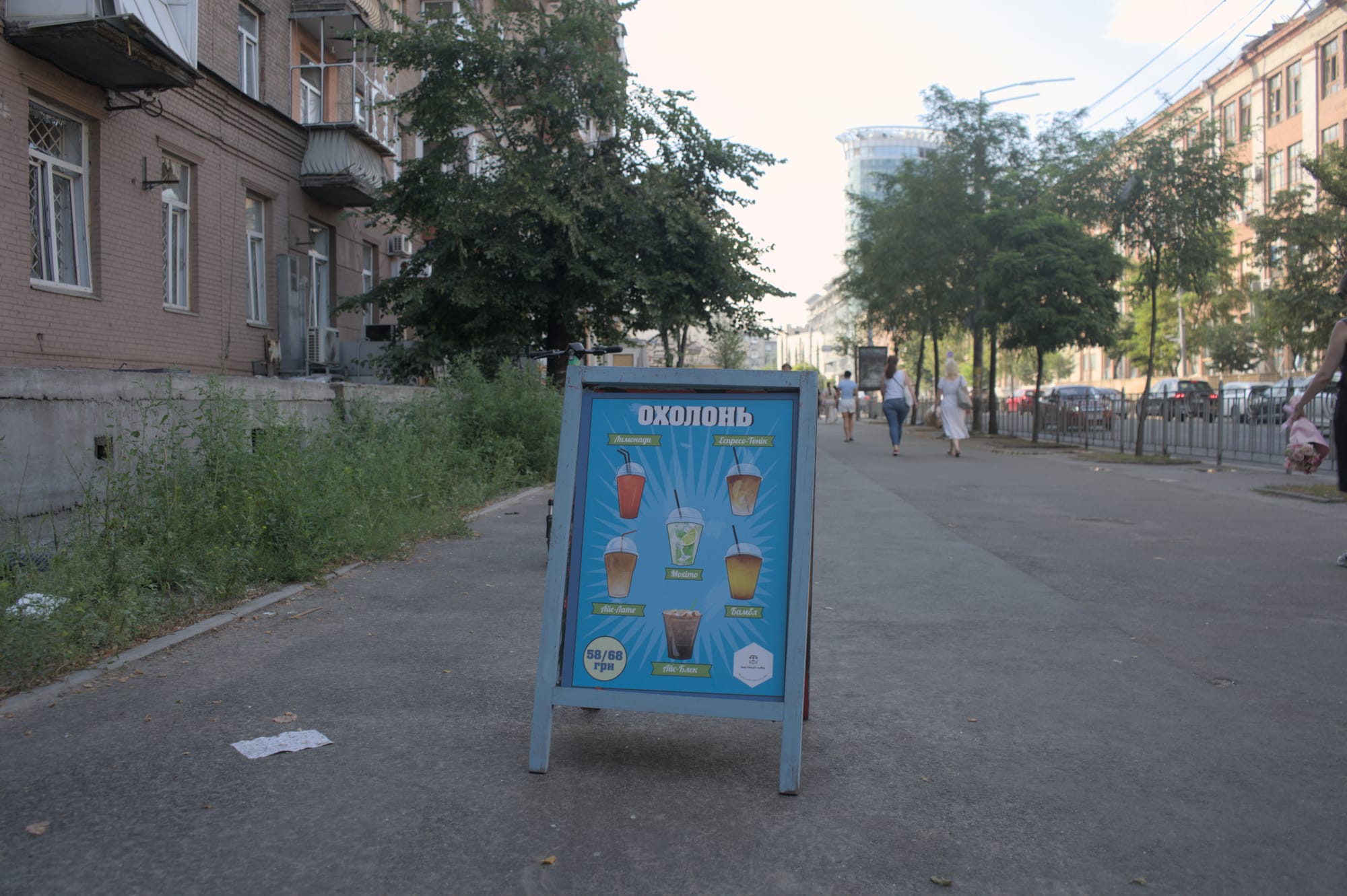
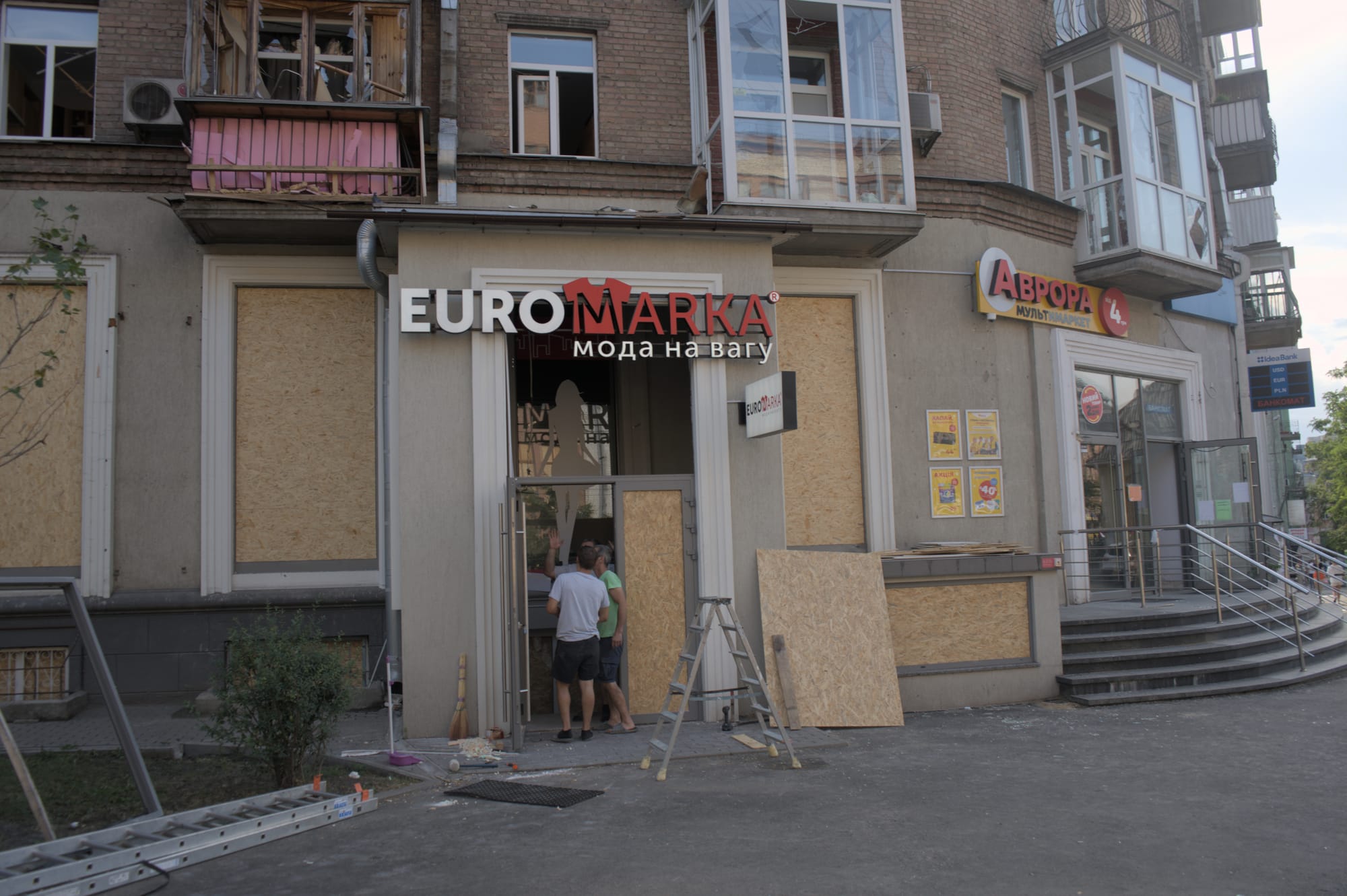
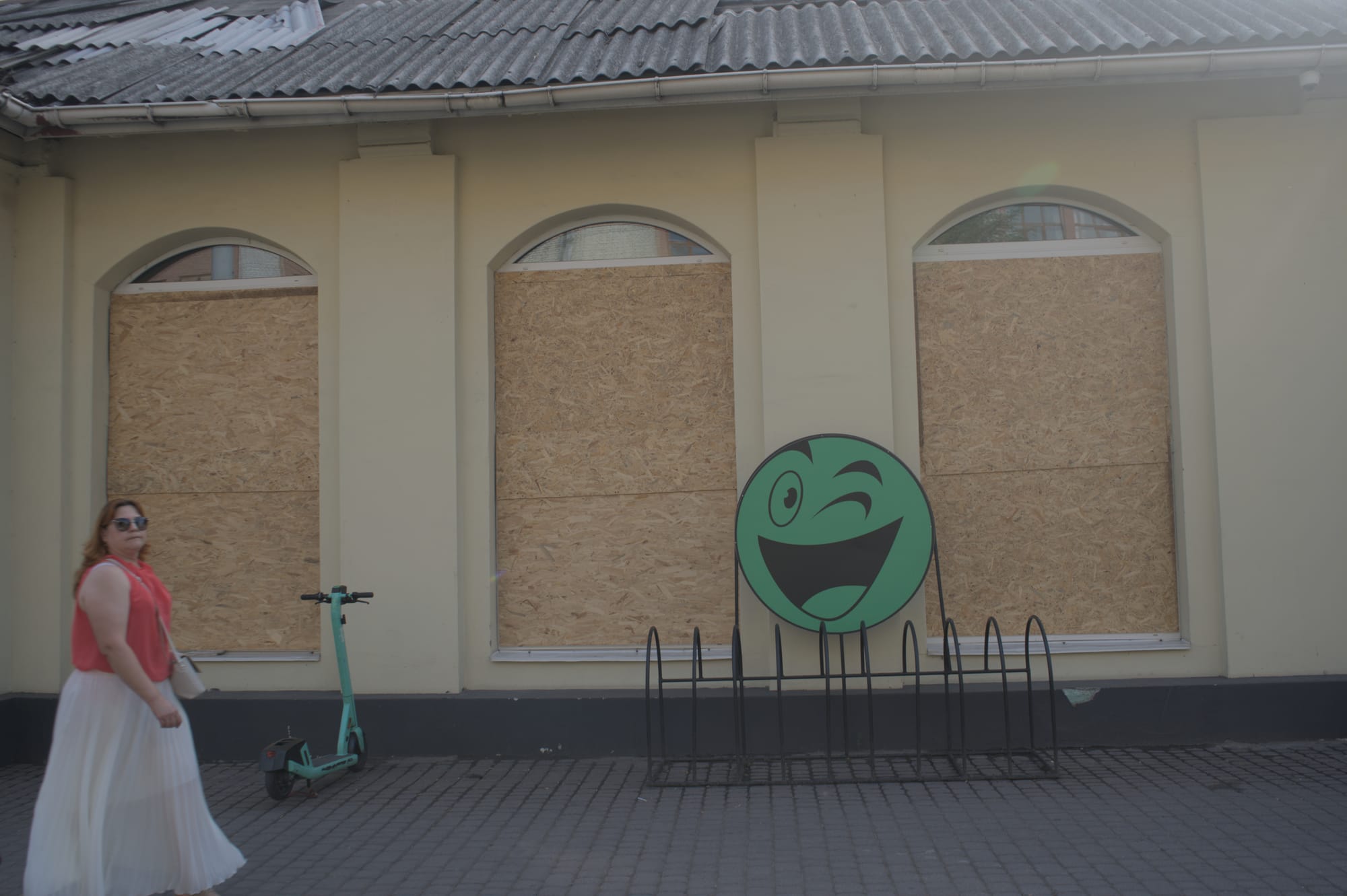
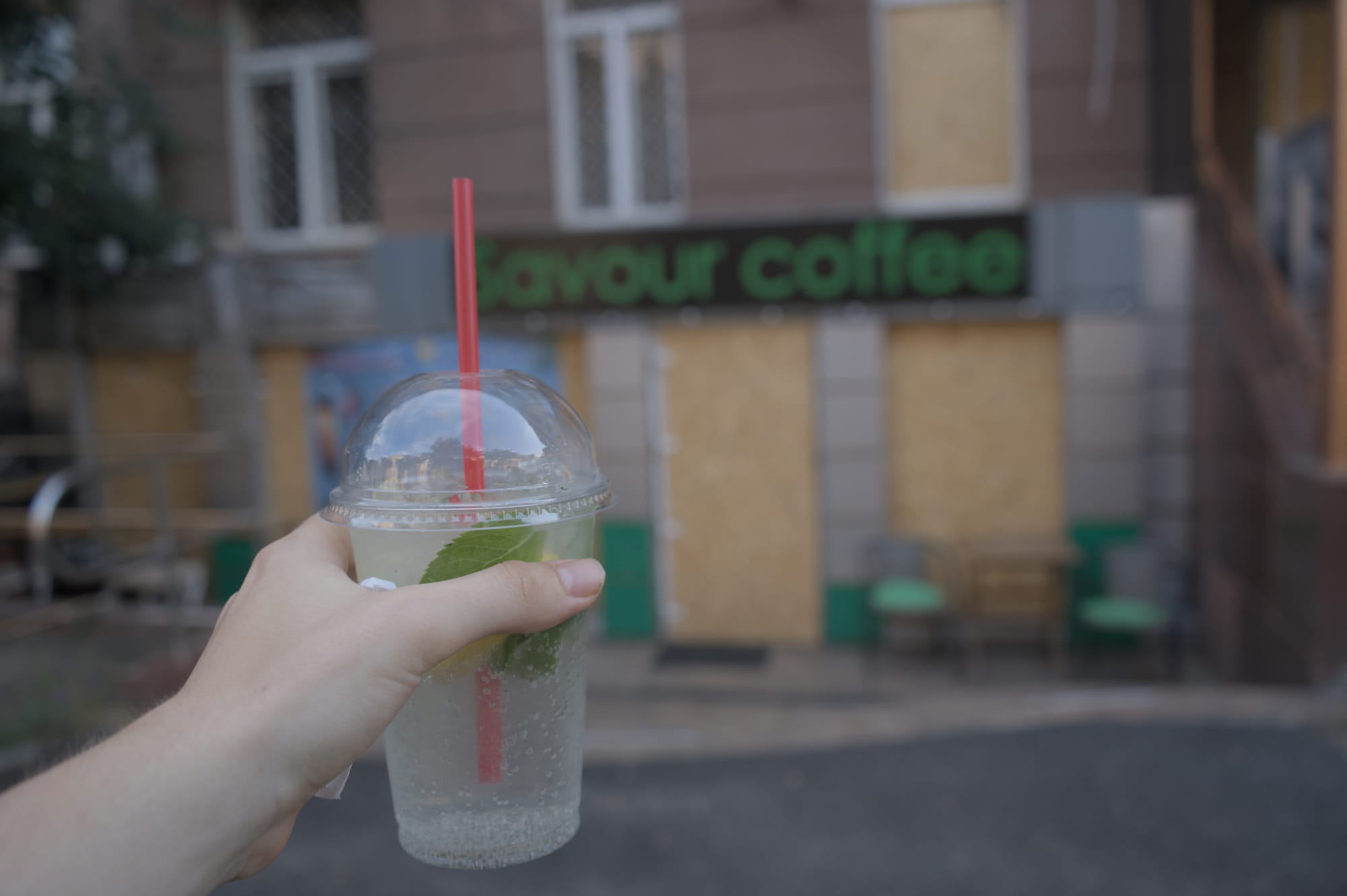
The impact site 5 days later. A lemonade I bought at a reopened coffee shop (right).
The following week, I also got to visit the Ohmatdyt hospital again. Here are some impressions:
In front of the main building, an excavator is tearing town facilities damaged by the missile, heavy dust hangs in the air.
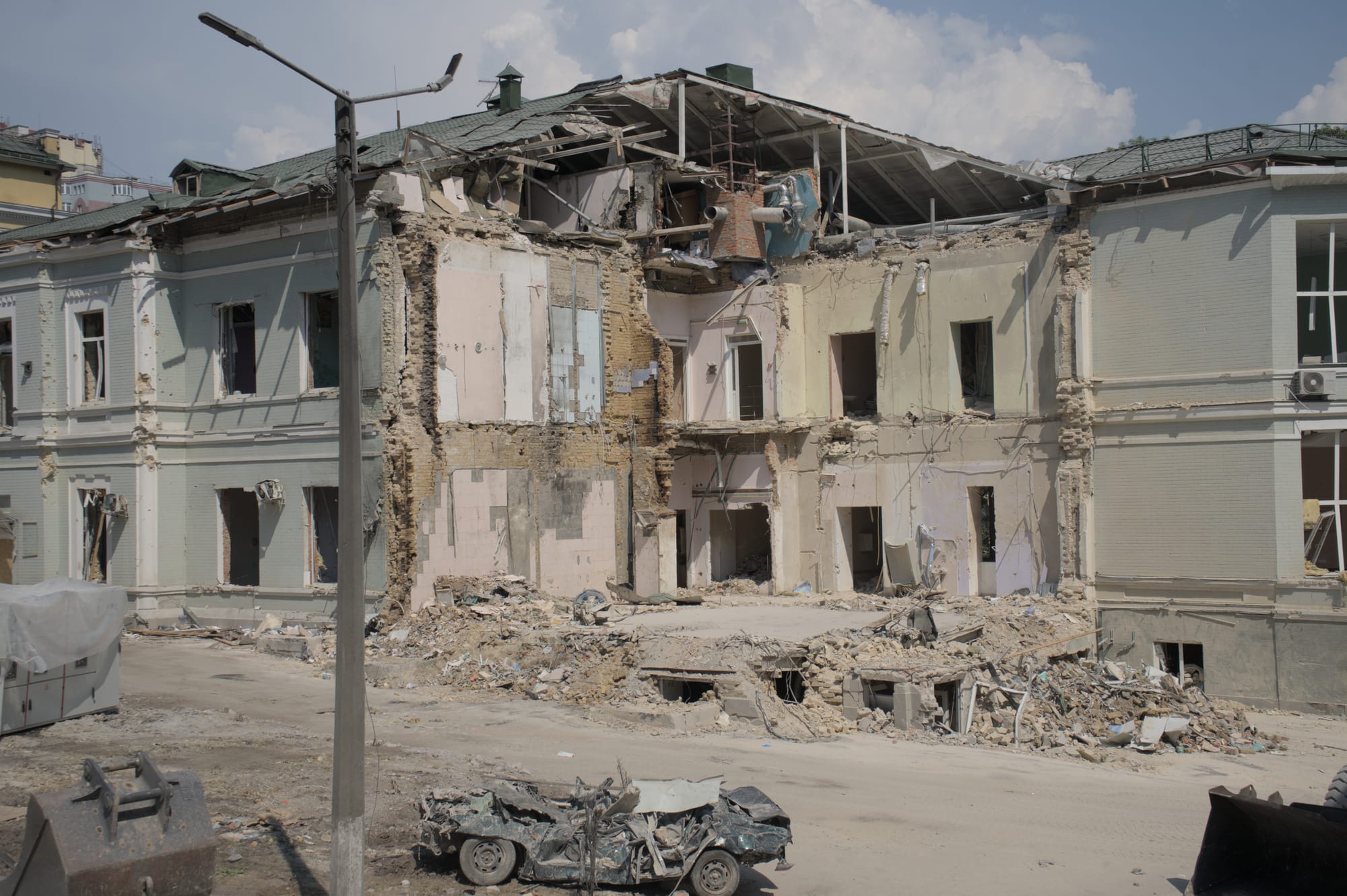
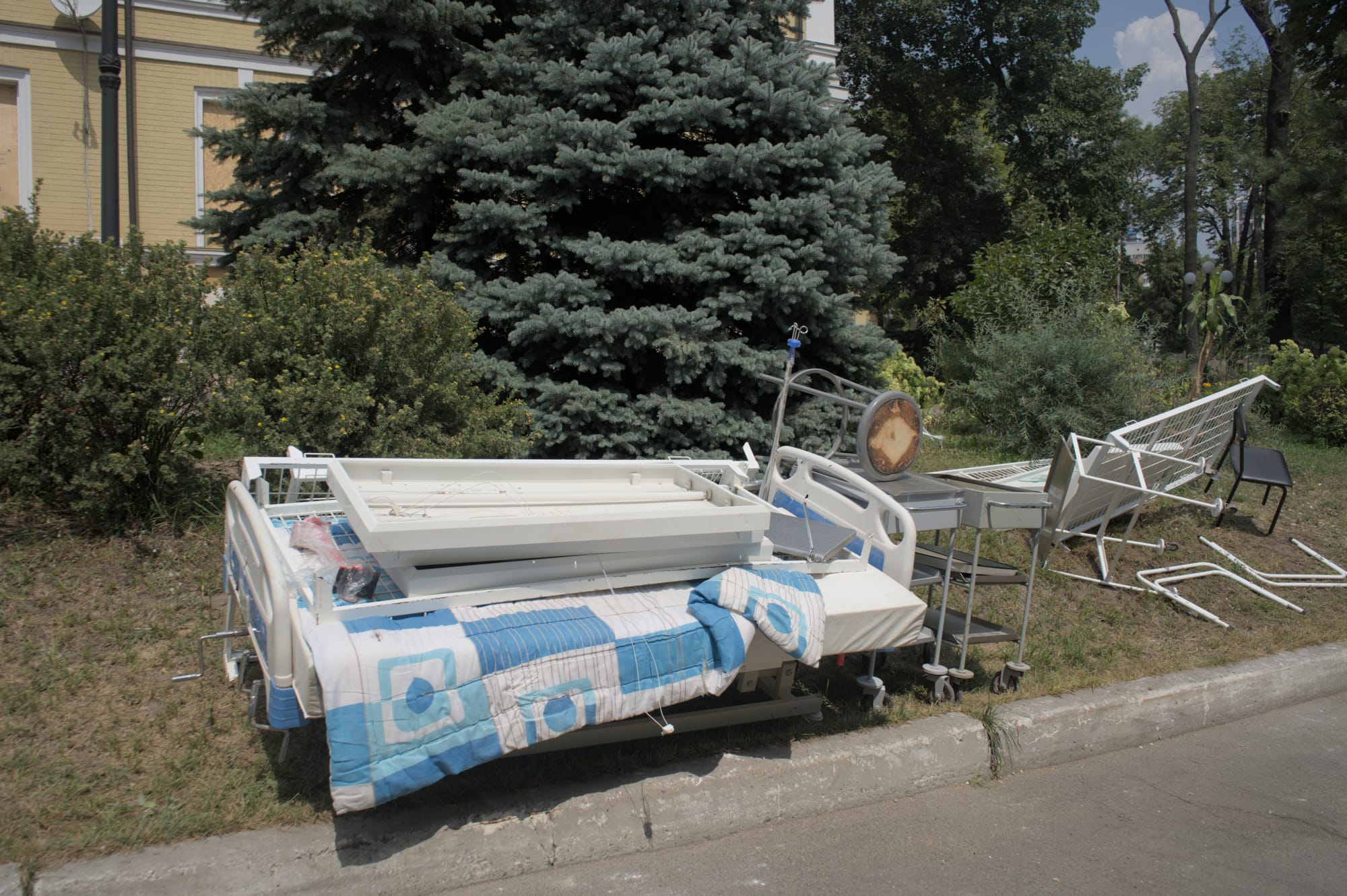
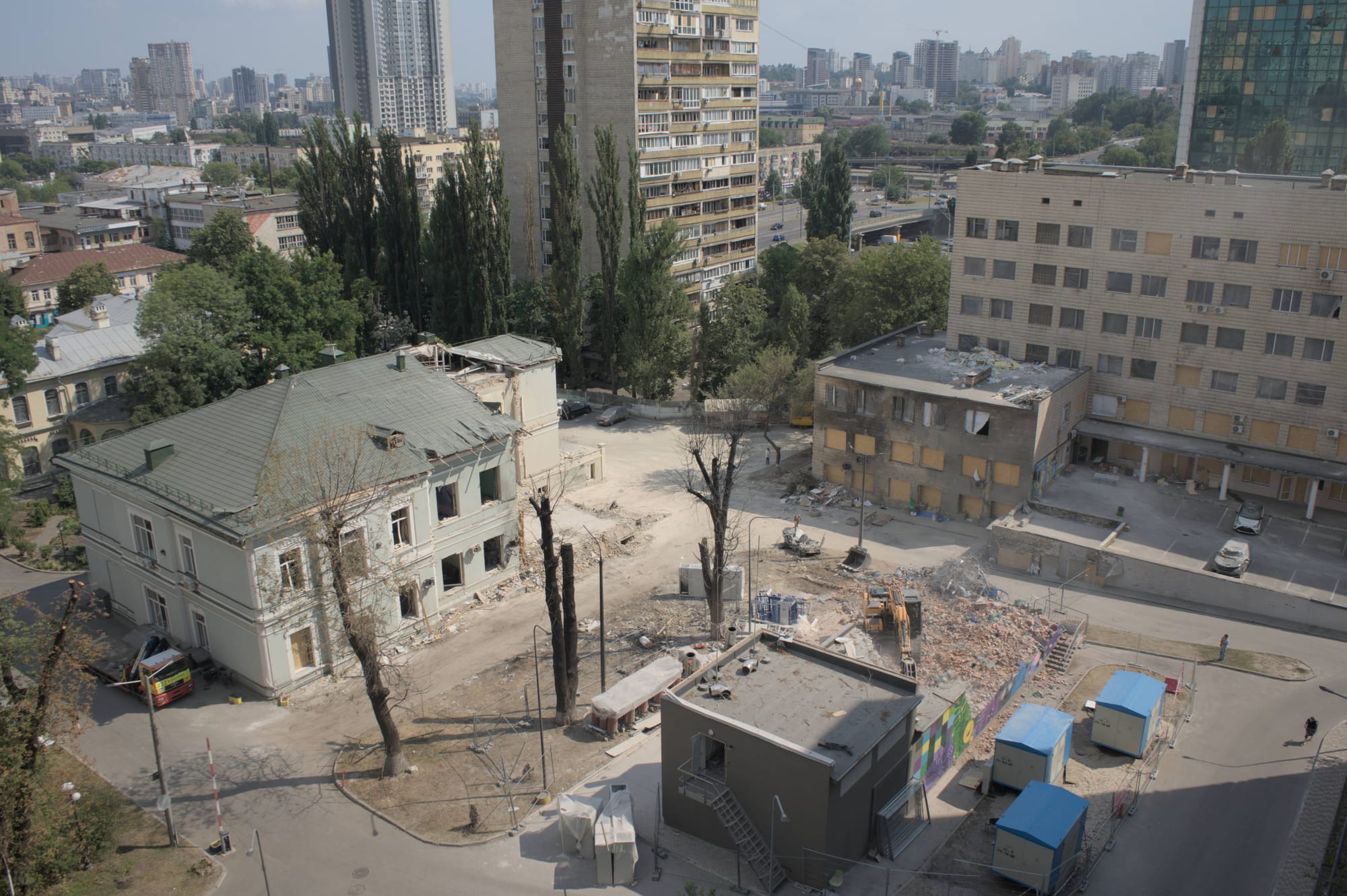
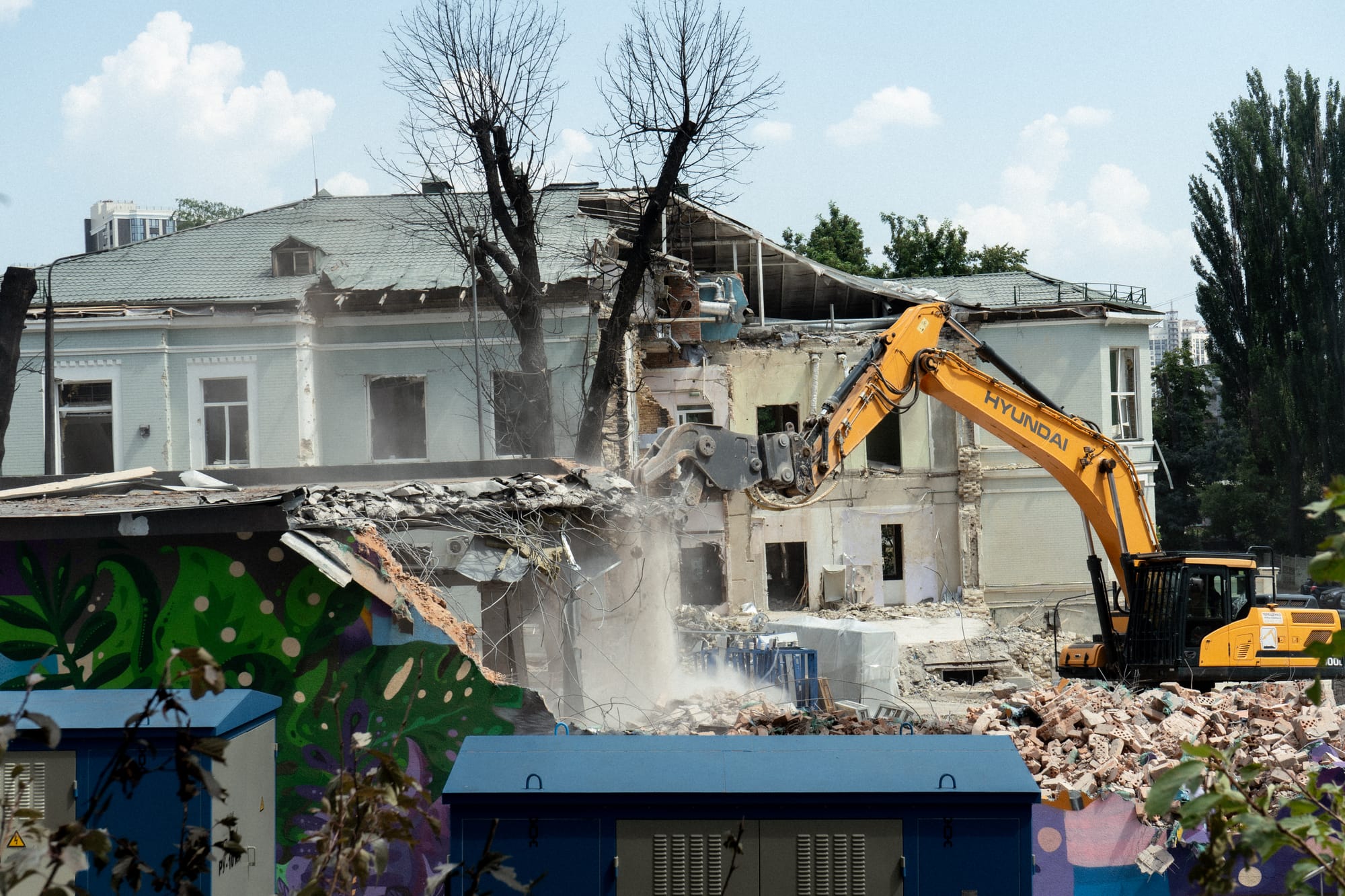
The yard of Ohmatdyt
Arriving at the main building, my lovely interpreter Li and I are immediately mistaken for volunteers and asked to help move some boxes.
At the reception, we meet our PR contact, Daria. Her makeup hides it well, but she has been working nine days straight. Before a missile hit their workplace, she and her two colleagues worked a normal communications job. Now they are wrangling the international press. When asked how she's coping, she's blunt: "I have mental problems."
She tells us about the situation and gives us a little tour: The destruction, the spot on the parking lot where a visiting grandfather's body was found without legs. But also the emergency department that was reopened just a day ago.
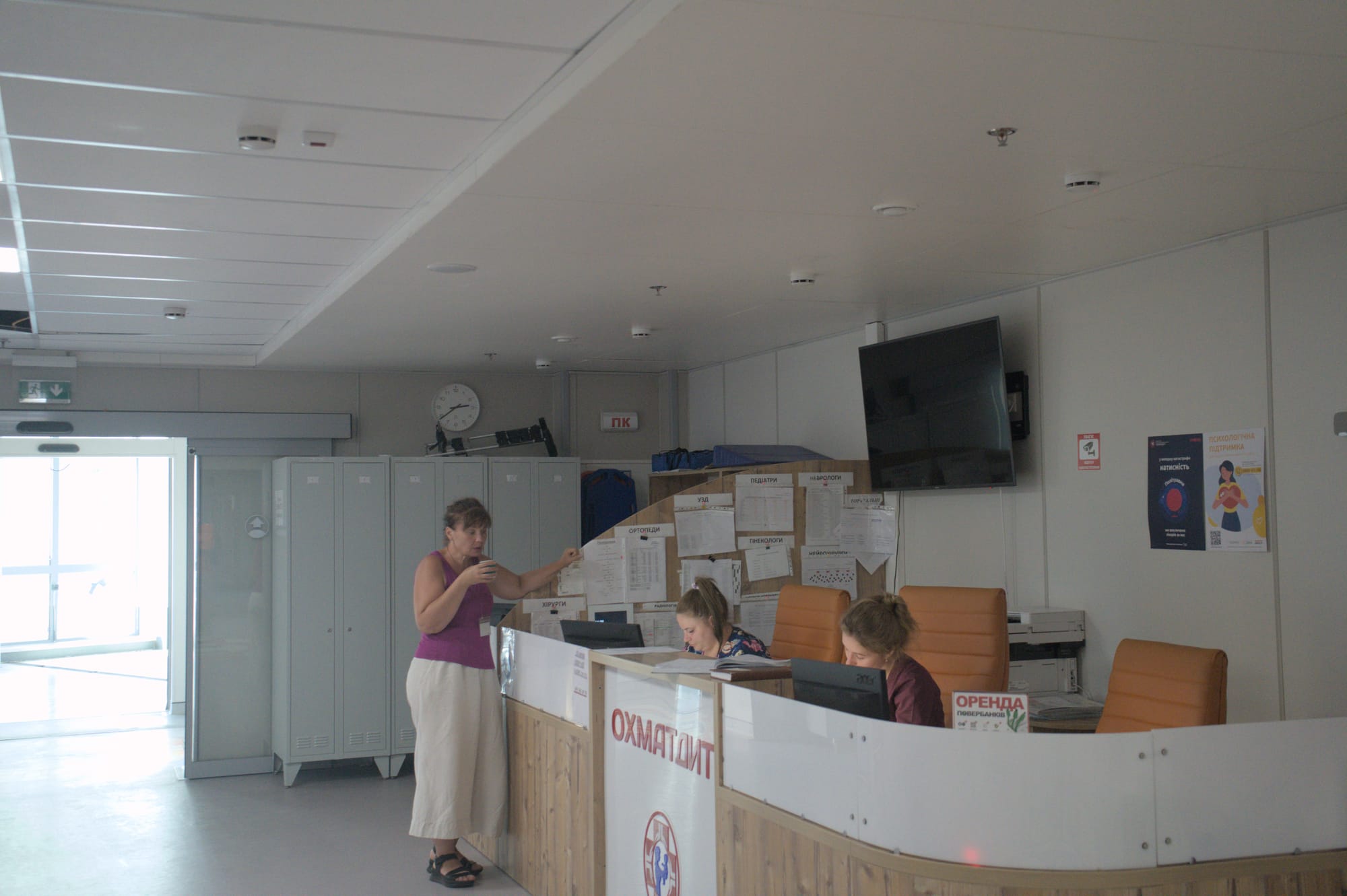
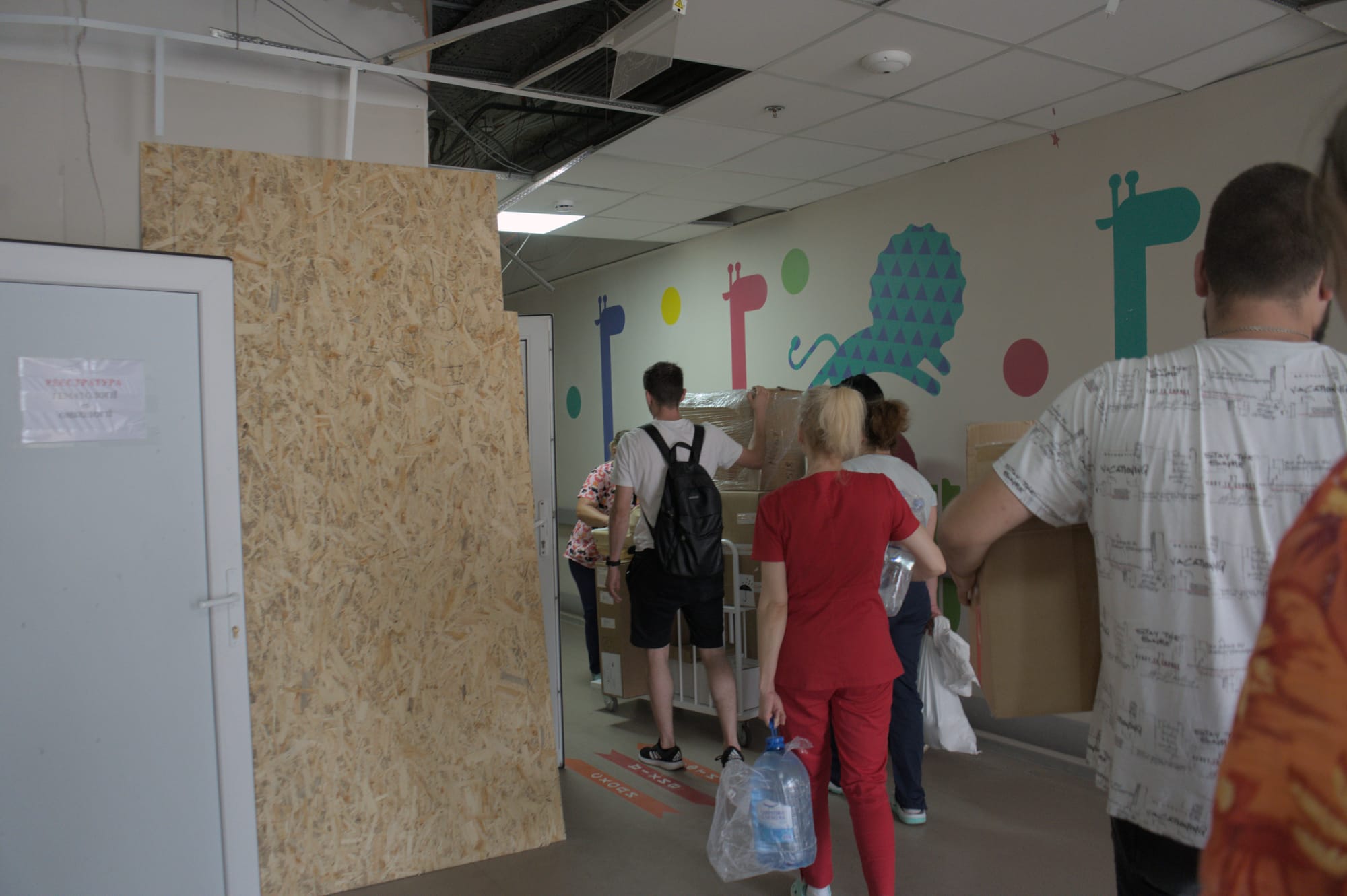
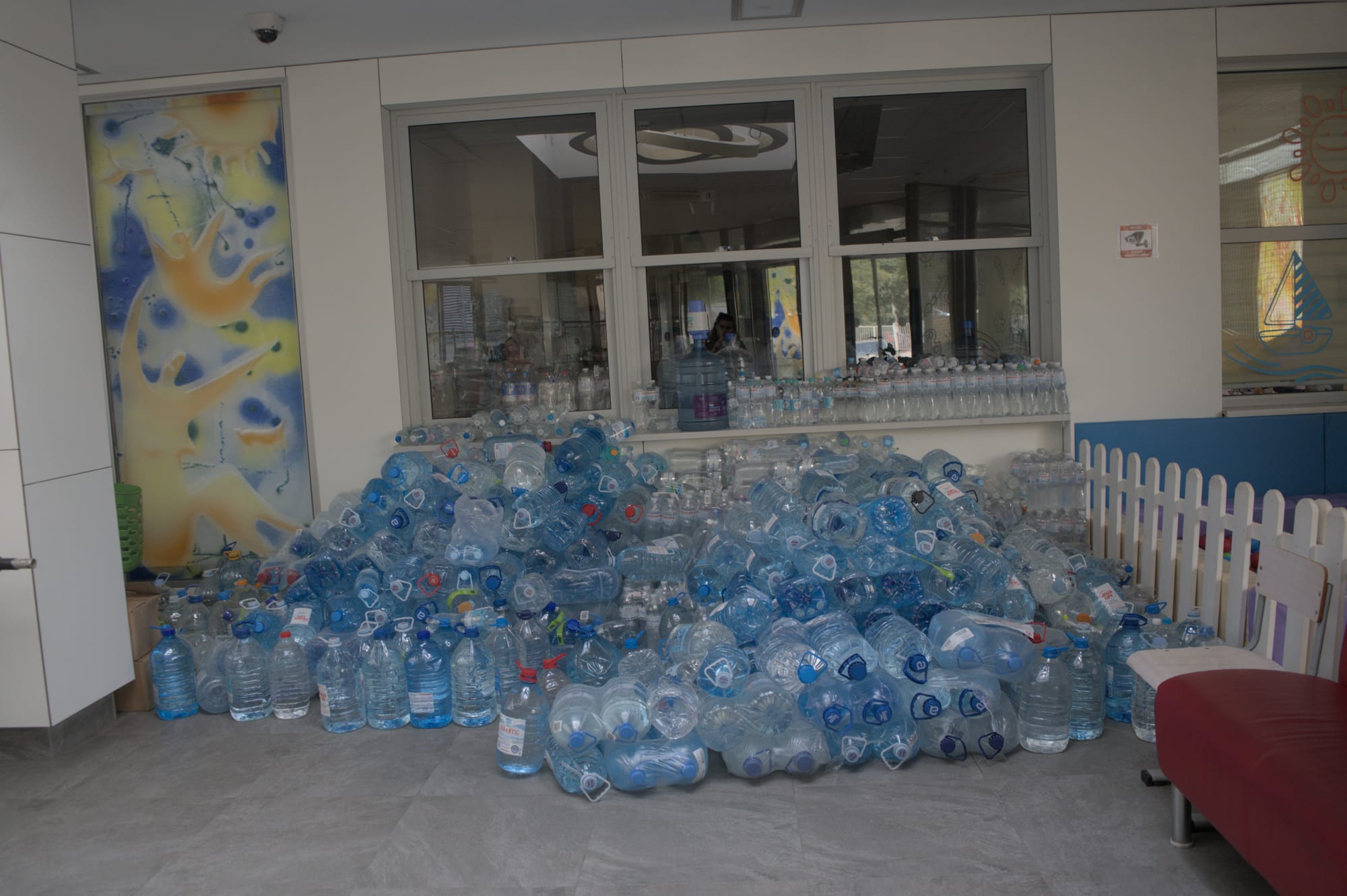
The reopened emergency department, waiting for patients (left). Volunteers and staff moving boxes (middle). Full & empty water bottles stacked at reception (right).
Then Daria leaves us on our own. Li and I wander around the hospital a little more. There is some activity on the lower floors, but the higher you go, the lonelier the hallways become - an uncanny sight in a hospital. The floors have been swept clean of glass and debris, the windows patched up with cardboard and plastic sheets. From the ceiling still hangs a lot of debris. A lot of debris still hangs from the ceiling.
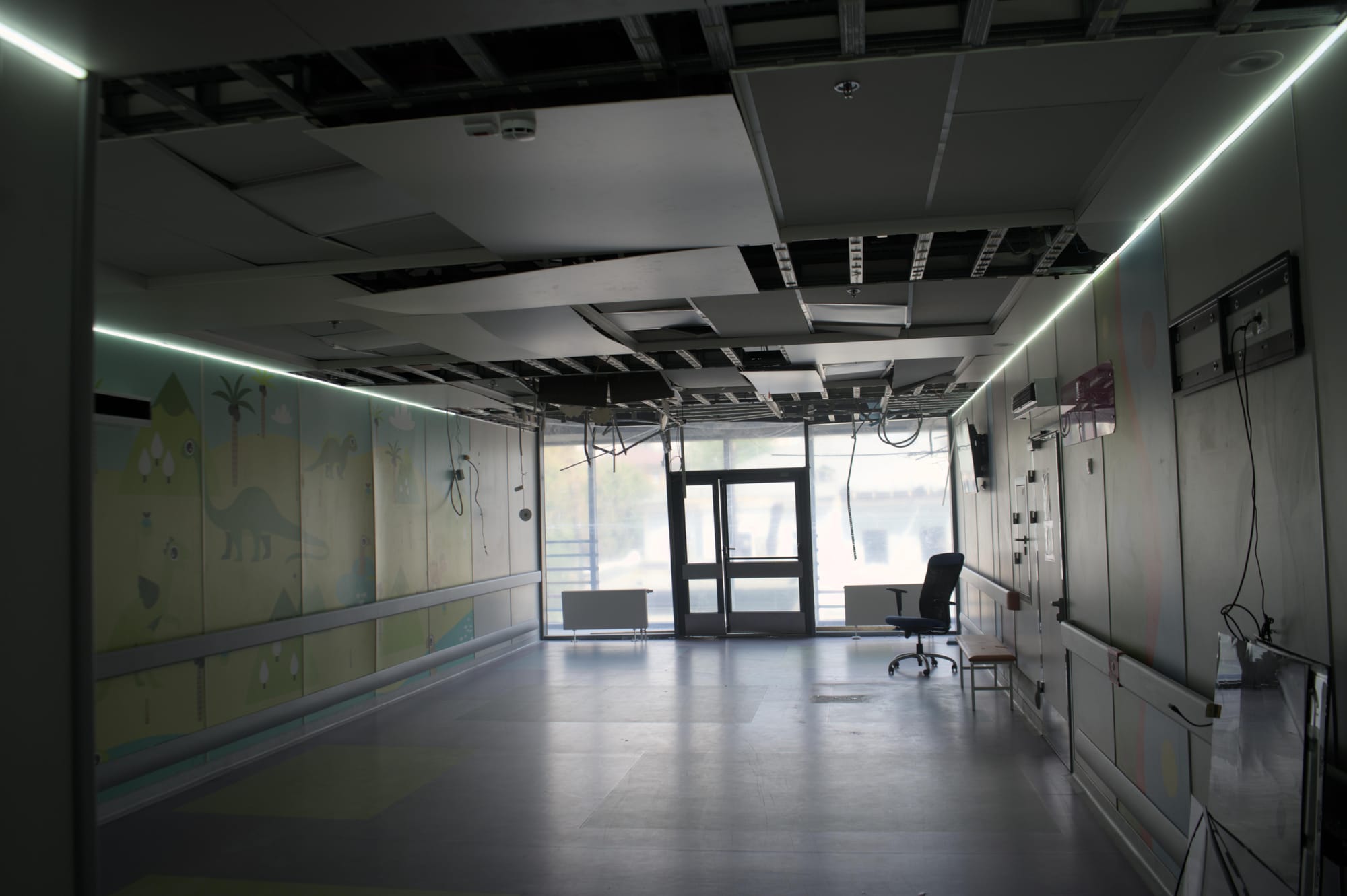
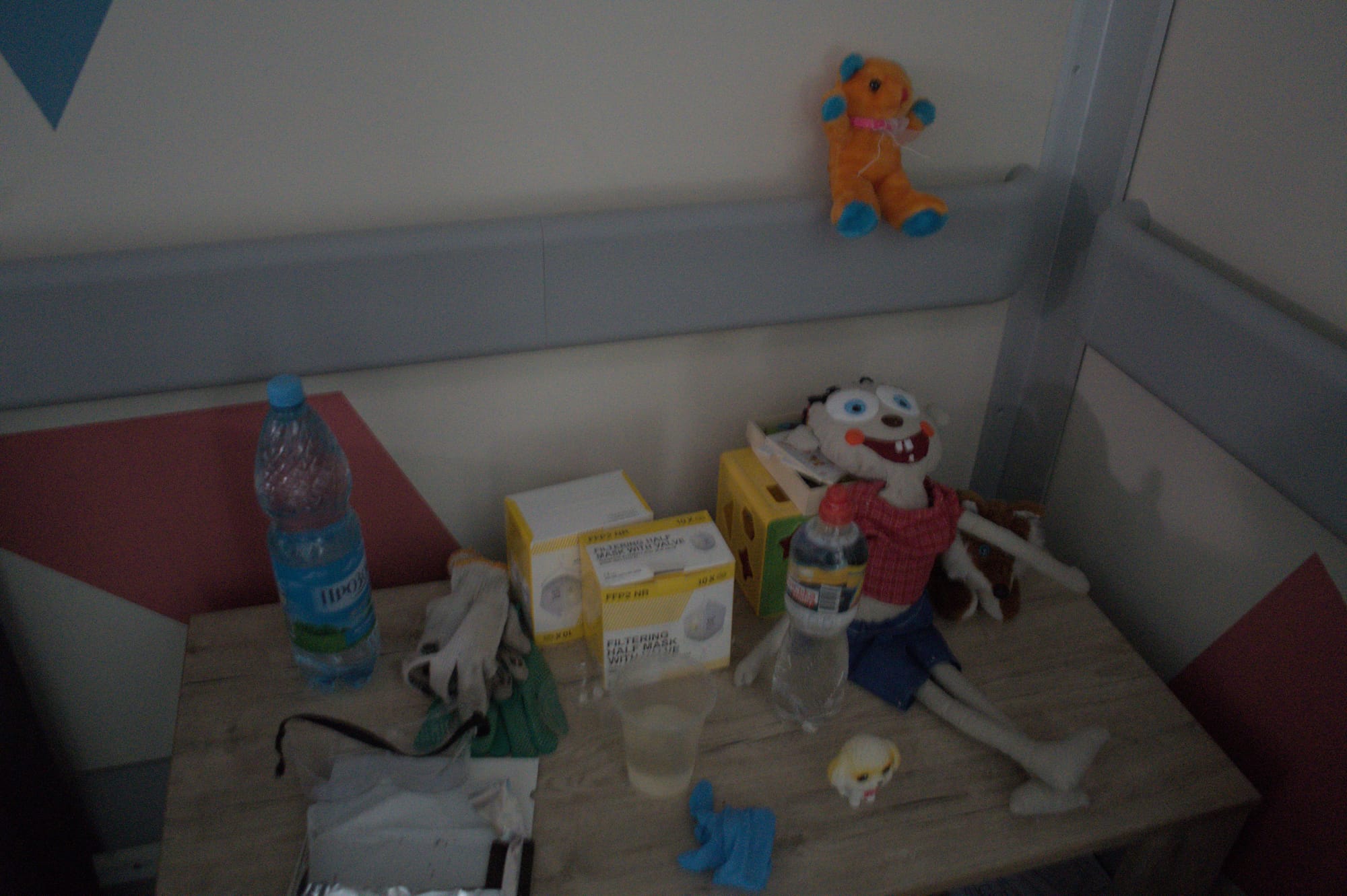
On the 6th floor, we meet a doctor from the urology department. In a stark contrast to everyone else's gloomy exhaustion, she's pretty upbeat and invites us into her ravaged office.
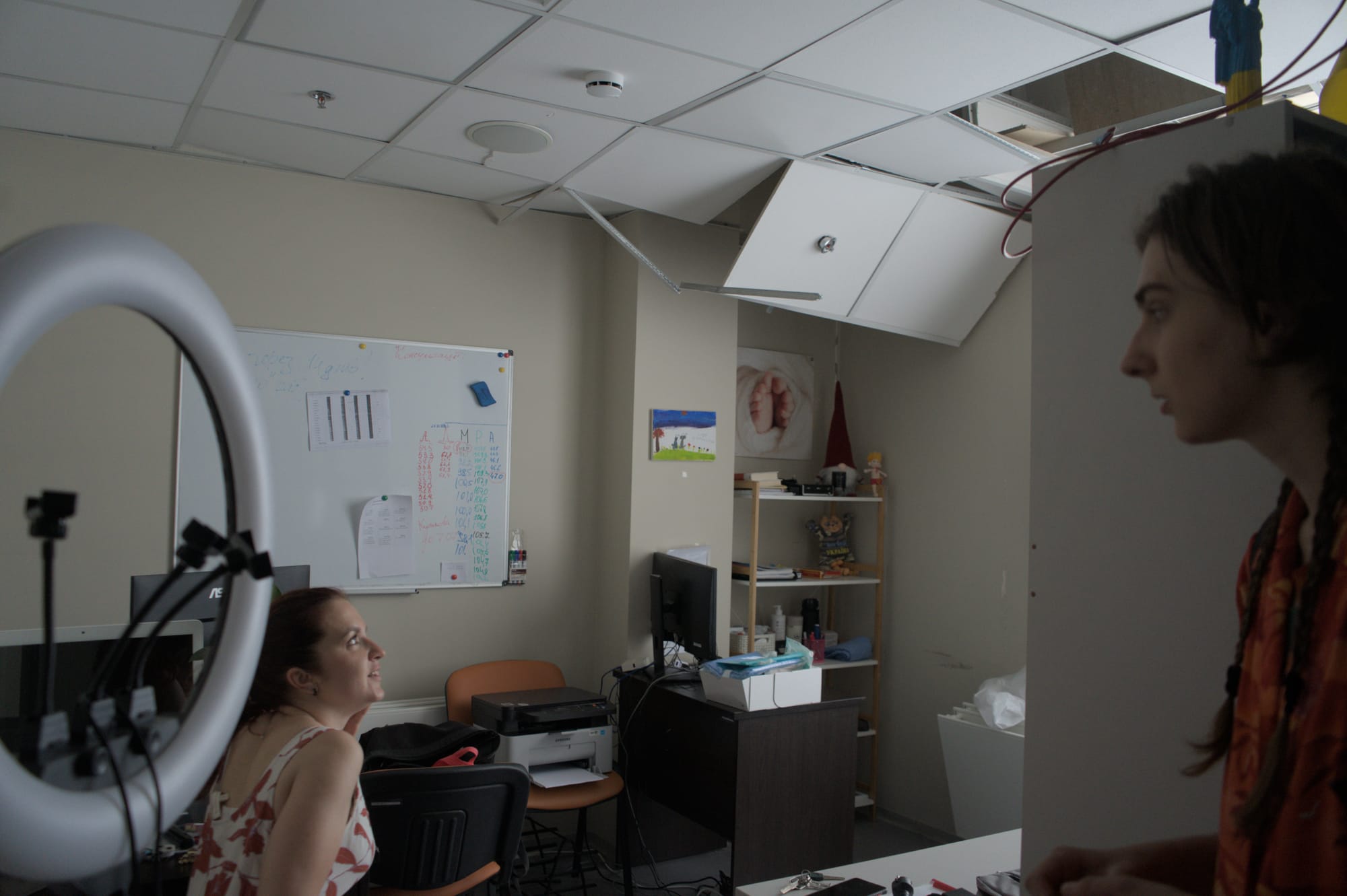
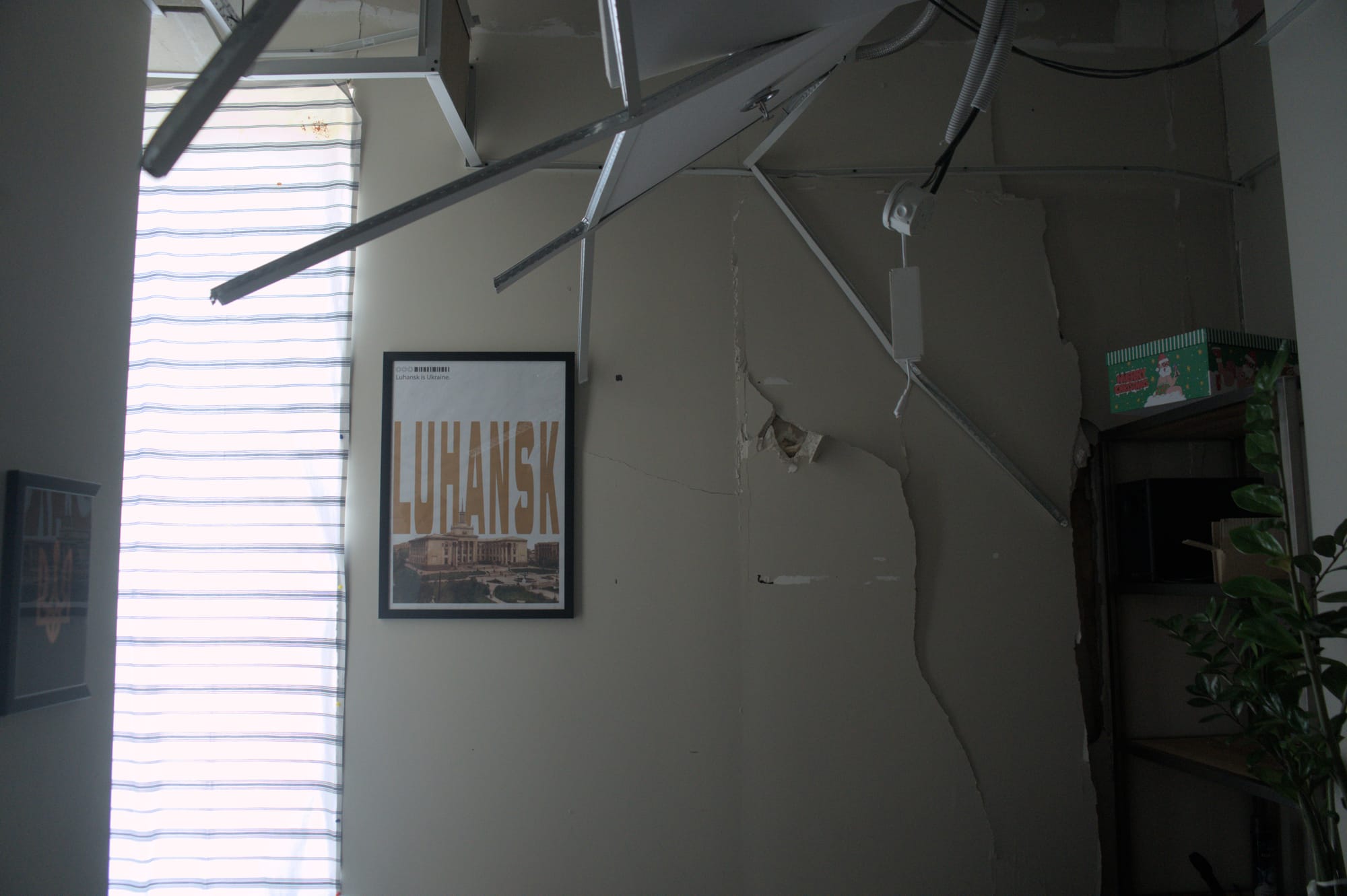
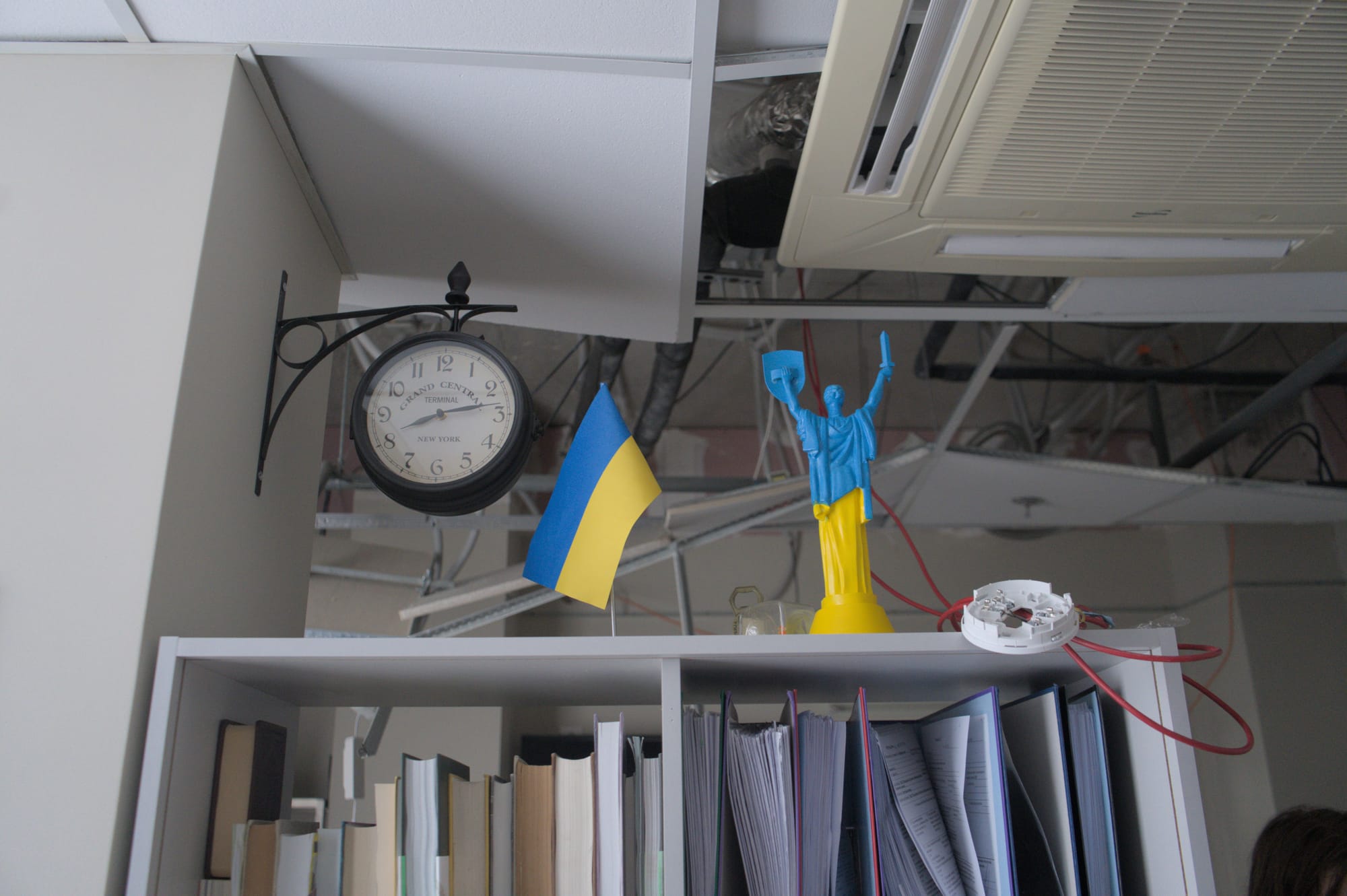
Finally, I want to close with some updates on the situation in the hospital, as of today (July 25):
- Some $16 million have been raised for reconstruction efforts. About $100,000 came from McDonald's Ukraine, which donated all its profits from cheeseburgers sold on July 9.
- A tender has been announced for the restoration of the entire hospital.
- Many departments are working again.
- Plenty of repairs are ongoing.
- Scheduled surgeries and intensive care are due to resume next week.
Source: Ohmatdyt's facebook page
